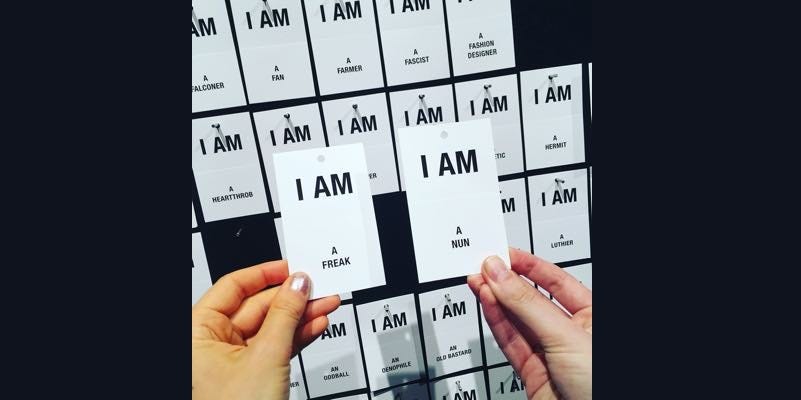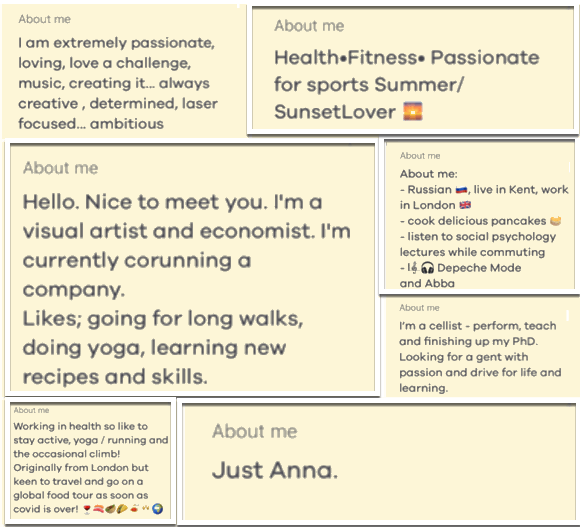How to answer "Who am I?"
How do you describe yourself? When put on the spot, how do you answer "Who am I?" The first thing that springs to mind is often what's most important to you. It can be revealing. But it's possible that you don't know the answer, in which case, does this mean you don't know who you are?
A fair few of us describe ourselves as a job "I'm a doctor", others by a religion “I'm a Muslim”, and some as a football team "I'm a Liverpool fan".
If you love your job then I can see why it's used as an identifier. If you're indifferent then I'd argue it shouldn't be used and could be an indication that you don't have enough going on in your life. Whether it's a job, religion or a football team, the noun we use is telling about how we live our lives.
Answering the question "who am I?" when dating
There's a diverse way "Who am I?" is answered when looking at a small sample of Bumble dating profiles below. Everything from "Passionate" to "Russian", "A cellist", and "Just Anna".
Describing ourselves on dating apps will be different than when we describe ourselves elsewhere. The answer to "Who am I" changes because there is no single "you".
Many selves
"The human self cannot be reduced to some ‘innermost core’. The ‘I’ is not one, it is many."
Selfie: How the West Became Self-Obsessed by Will Storr
There is no single you. Your work self is different to your being around friends self, a well-rested you is different to you with only 5 hours sleep. Even the time of day affects who you are according to the author of Subliminal:
Not only are we different people at fifty than we are at thirty, we also change throughout the day, depending on circumstances and our social environment, as well as on our hormonal levels. We behave differently when we are in a good mood than when we are in a bad one. We behave differently having lunch with our boss than when having lunch with our subordinates. Studies show that people make different moral decisions after seeing a happy film, and that women, when ovulating, wear more revealing clothing, become more sexually competitive, and increase their preference for sexually competitive men. Our character is not indelibly stamped on us but is dynamic and changing. And as the studies of implicit prejudice revealed, we can even be two different people at the same time, an unconscious “I” who holds negative feelings about blacks—or the elderly, or fat people, or gays, or Muslims—and a conscious “I” who abhors prejudice.
[Subliminal: How Your Unconscious Mind Rules Your Behaviour by Leonard Mlodinow]
So context is key when answering "Who am I?" You'll answer this differently at work vs at a party, or on Twitter vs on Facebook or LinkedIn. Getting to the genuine "I" of "Who am I" needs a neutral environment with no sign of your ego. There needs to be no pretence. So the most honest answer to "who am I?" is when you ask yourself.
Which "I am" are you?
Walking through the theatre at the much-lauded magical show In & Of Itself, there’s a wall full of "I am" cards. Everyone picks a card that best describes them and it’s used later in the show. When Bill Gates attended he chose "I am a leader". Every "I am" card you can think of is available, from the ordinary "I am a freelancer" to the extreme "I am a master of the universe" and the sad "I am a nobody".
Now pretend you are walking past this wall full of “I am” cards and it's infinite. You have to choose one, which is it?
"I am" categories
You're not alone if you're not sure which "Who am I" best describes you. To assist your thought process it helps to categorise how we answer the question. I've listed nine. You'll have a stronger affinity towards some categories than others and maybe one really stands out. For what it's worth, I've added my answers too.
If you live and breathe your job and give the most weight to this category then you have any easy "Who am I?" answer. Or maybe you have strong affinities in multiple categories. Although, I'd argue that everyone has one category that is more them than another.
For me, I have mild to zero allegiances with all categories. I don't think this is necessarily good, there's something to be said for answering with conviction. Maybe not all though, do I want to strongly identify with a political party or sports team? ...probably not. Although not listed, I would add "Brands" into the bad choice category.
As ridiculous as it sounds, big companies want us to become them. Micheal Easter discusses this in his book The Comfort Crisis "Fast Company recently reported that more big American corporations are dumping money into building a sense of “brand belonging,” a sort of advertorial shift from 'buy us' to 'be us.'"
"commercial opportunity exists because we need belonging at a fundamental level ... and great brands will step into the vacuum"
What's in a name?
"I'm John" appears to be bad grammar, how can you be your name and how can your name define you? That being said, it's not outlandish to believe that our names influence who we become. Anyone that's read Freakonomics will remember the chapter on the father who experimented by naming one son "Winner" and the other "Loser". Whether it was their names or not, both grew up to be drastically different individuals. In more scientific studies it has been shown that boys given feminine sounding names are more likely to misbehave.
I don't see how your name can be the best way to describe who you are. That being said, it's possible you become your name and apparently that's why so many people named Dennis become dentists.
Does it matter who you are?
Does it matter how you answer the question: who am I? Obviously not, however, it's interesting to know the answer, just like it's interesting to know how tall you are or how much you weigh.
If you don't like your answer then the good news is "who you are" is not set in stone. I'd bet that many of us struggle to give a definitive answer. In such cases, I'd use envy as insight. Whose "I am" do you envy? For me, it would be "I am a traveller". The good news is, just like our weight, we can change who we are.





